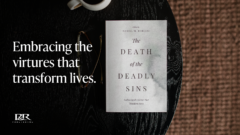I wanted to post a brief follow-up to Monday’s article in which I asked Who Shapes Your World? I think the issue of celebrity and heroism was a fascinating component of the James Bradley’s book Flags of our Fathers. In the book he described the infamous battle of Iwo Jima, but he did so within the context of his search for the role his father played in that battle. His father, John Bradley, a Navy corpsman who was assigned to the Marines, was one of the men who raised a flag over Iwo Jima in what has become the world’s most reproduced and most famous photograph. His father was thrust into the role of hero or celebrity based on raising that flag, and yet he very rarely spoke of his role in the battle in his life after the war. He mentioned it only once to his wife and only a couple of times to his children. It was only after his death that his children began to consider what their father had done and to try to unravel why he would not, could not, speak of the war. They wanted to know how their father became a hero.
Hero. In that misunderstood and corrupted word, I think, lay the final reason for John Bradley’s silence.
Today the word “hero” has been diminished, confused with “celebrity.” But in my father’s generation the word meant something.
Celebrities seek fame. They take actions to get attention. Most often, the actions they take have no particular moral content. Heroes are heroes because they have risked something to help others. Their actions involve courage. Often, those heroes have been indifferent to the public’s attention. But at least, the hero could understand the focus of the emotion. However he valued or devalued his own achievement, it did stand as an accomplishment.
The moment that saddled my father with the label of “hero” contained no action worthy of remembering. When he was shown the photo for the first time, he had no idea what he was looking at. He did not recognize himself or any of the others. The raising of that pole was as forgettable as tying the laces of his boots.
The irony of John Bradley’s celebrity is that, during the battle of Iwo Jima he was a hero many times over. His heroism earned him a Navy Cross, the Navy’s second highest decoration. His son writes, “the flagraising, in fact, might be seen as one of the few moments in which he was not acting heroically.” He knew that the act of planting a flag in the ground was not an act of heroism, but was an act that had made him a celebrity. “He knew real heroism. He could separate the real thing from the image, the fluff. And no matter how many millions of people thought otherwise, he understood that this image of heroism was not the real thing.” John Bradley had no interest in celebrity and resented those who sought to bestow it upon him.
On Monday I wrote about our culture’s obsession with celebrity and shared some wise words that Os Guinness wrote in The Call. He discusses fame and heroism and the call of Christ and provides three reasons that heroism has fallen on hard times. It is the second reason that most gripped me. Guinness points to the press and media and their role in creating the modern celebrity. He did this long before “American Idol” and the rise of the “reality” show, forces that have created celebrities (or “heroes”) faster than ever before. These forces widen the gap between “fame and greatness, heroism and accomplishment.” It used to be that heroism was linked to the honor of accomplishment so that only those were regarded as heroes who had actually made some grand accomplishment, whether in “character, virtue, wisdom, the arts, sports or warfare.” Sadly, this is no longer the case. Today we find that the media offers a shortcut to fame–“instantly fabricated famousness with no need for the sweat, cost and dedication of true greatness. The result is not the hero but the celebrity, the person famously described as ‘well-known for being well-known.’ A big name rather than a big person, the celebrity is someone for whom character is nothing, coverage is all.”
Daniel Boorstin in his book The Image, aptly defined fame in our societal context. “The hero was distinguished by his achievement, the celebrity by his image. The celebrity is a person well known for his well-knownness. We risk being the first people in history to have been able to make their illusions so vivid, so persuasive, so realistic that we can live in them.” Gregory Foster, a professor at the National Defense University in Washington, D.C, wrote on this subject recently. “Celebrities…are qualitatively quite different than heroes, markedly inferior to them in fact. The celebrity is nothing but a person of celebrity, well known for his well-knownness,” he wrote. “Heroes, in contrast, are transcendent, mythic, seemingly superhuman figures who combine greatness with goodness. They may have charisma, presence, and ‘gravitas’; they must demonstrate courage, vision, and character-selfless character. Heroes have stature, if not size.”
It would be easy to dismiss this subject as irrelevant to the Bible-believing Christian, sweeping it away with a terse statement that Christians are not to have heroes. And yet it is not that simple. We, as humans, are naturally followers. There is something in us, and something that I think precedes the Fall, that precedes our sinful natures. Whatever this is causes us to want to follow others. Foster writes, “we are all followers at heart. We praise and preach leadership, but we practice followership. Consciously or not, we constantly seek someone beyond ourselves to tell us when and how high to jump. Better that we relinquish ourselves to someone worthy of adulation and veneration than to the many charlatans and demagogues who prey on us.” Christians are not exempt from this and constantly seek others to emulate. The Bible does not appear to frown on this, but anticipates it, expects it. I think of the admonition of Solomon that “Whoever walks with the wise becomes wise, but the companion of fools will suffer harm.” I think of Paul exhorting the Corinthians to “be imitators of me.” I think of the lofty moral requirements of those who are to be leaders in the church. Truly we all seek to follow, even those who also seek to lead.
And yet we often follow poorly. With our very souls at stake, it is crucial that we choose our heroes well. Far too often we seek to emulate not those who are most godly, but those who have the highest profiles. We choose our heroes poorly and are molded into the image of men or women who have not first been shaped into the image of Christ. We follow Christian celebrities rather than emulating true heroes. We follow those who are content to be celebrities, even Christian celebrities. We follow those who offer no stature, only size.
It seems to me that John Bradley knew something that too many in our culture, whether Christian or not, are content to ignore. He saw celebrity for what it was: instant, empty and fleeting. He knew that true heroes are those who are known and remembered not for a meteoric rise to prominence, not merely for being known, but for accomplishment and character. If only we were so discerning.










